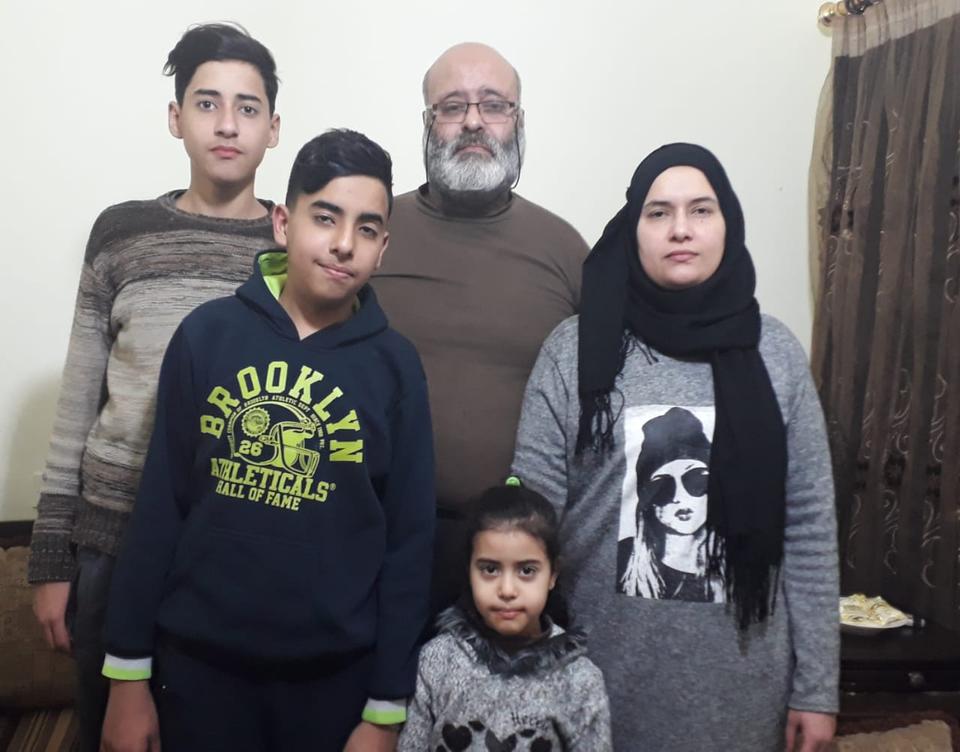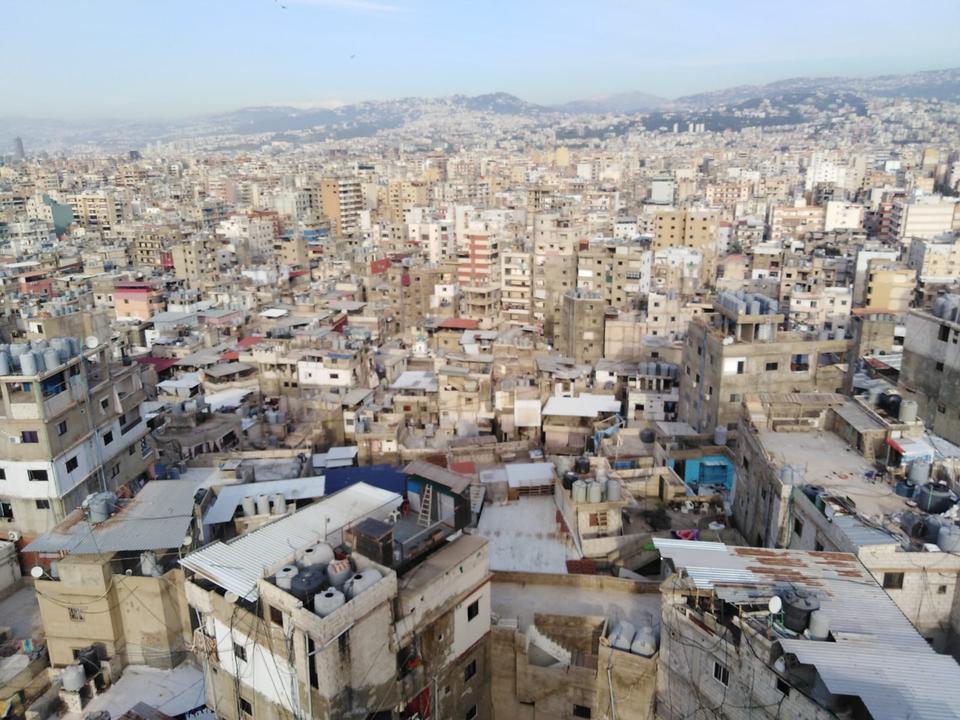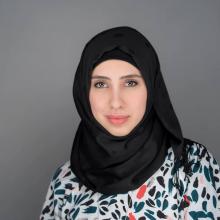Fifty-year-old refugee Mhanna al-Hussein suffers from rare Behcet’s disease but can not afford the $1,800 injection every month
Mhanna, a Palestinian refugee who arrived in Lebanon in 1948, suffers from the rare Behcet's disease, which causes painful swelling in joints and inflammation in the veins and eyes.
Battling the severe pain is, however, just half of Mhanna’s problems.
His search for life-saving medicine in a country ravaged by a crippling economic crisis, described by the World Bank as one of the worst in global history since the 19th Century, is now becoming even more painful.
No longer able to work, Mhanna is now dependent on his wife who has to provide for the family of five, including three school-age children. Friends and well-wishers help out occasionally as he struggles to procure the cheaper but less effective medicines. He can no longer afford the more expensive injection — which costs a staggering $1,800 per jab.

How was his disease discovered?
Mhanna’s family was one of the 700,000 people who fled Palestine in the wake of the 1948 “Nakba” — also known as the Palestinian Catastrophe. Most of the refugee families took shelter in Syria, Egypt, Jordan, and Lebanon.
Burj al Barajneh camp was established in 1949, four kilometers south of Beirut, to house Palestinian refugees. Today, the camp shelters more than 20,000 people, according to the latest UNRWA figures.
Mhanna's family, whose origins go back to the Palestinian village of Al Ghabasiya in Akka, also landed in the same camp, where life has always been harsh. Until last month, Lebanon prohibited foreigners, including Palestinian refugees, from working in about 70 professions, which included medicine, pharmacy, engineering, law, newspapers, and others.
But in early December this year, the Lebanese Minister of Labour made a groundbreaking amendment to the country's labour laws and allowed foreigners to practice these professions.
Since Palestinian refugees have almost always lived along desperate margins, the daily grind took a toll on their collective health.
According to UNRWA, a decade ago 95 percent of Palestinians did not have health insurance in Lebanon and their health problems had multiplied because of a lack of proper medical care.
In Burj al Barajneh alone, at least 17 percent of women suffer from heart diseases, 15 percent have neurological diseases and 8.5 percent have vision problems, while 7 percent have disabilities.

About five years ago, Mhanna's health condition started to deteriorate, too. But it took several years for doctors to determine the exact cause of his problems.
"I had the disease about 10 years ago, but I didn't know [that it was Behcet’s disease] until 2017. At first, I had severe pain in one of my big toes. I went to more than one doctor who asked for CT scans and x-rays. Then they told me I had gout [a form of arthritis with similar swelling and pain in joints]," Mhanna tells TRT World.
Doctors banned Muhanna from eating meat and chicken for a whole year. They prescribed ointments and pills, but the swelling and pain in his feet remained.
"I used to live on sedatives, that would take the pain away, but my condition never got better," Mhanna adds.
Years passed, and the Palestinian refugee went from one doctor to another to find a cure.
"The pain increased, and I could not walk without a crutch. Whenever someone told me about a good doctor, I would go immediately, despite my financial condition, which began to deteriorate due to the many medications and tests. It was all hopeless until the most difficult day of my life came," Mhanna says.
It was the sixth doctor who finally diagnosed Mhanna’s ailment after several tests.
"I remember what he said to me: ‘What I was afraid of, Mhanna, has happened. You suffer from a vile disease that is more insidious than any other disease’," Mhanna quotes the doctor as saying.
“The doctor added, ‘You have a disease called Behcet's syndrome. I will explain its symptoms to you and tell you what you may suffer in the future’,” he recalls.
And even more grim warning was to follow from the doctor. "Every joint in your body will hurt you, then the pain will move to your eyes, and your vision will decrease, then it will move to your brain. You may have a fatal stroke or a stroke that will throw you to bed for years without moving," Mhanna remembers the doctor telling him.
Crippled by disease and poverty
Aware of the refugee’s financial situation, the doctor explained to Mhanna that he had two lines of treatments: the first, the injection, is very expensive. The second is less expensive, but it has harsh side effects, including significant weight gain and swelling.
Mhanna had no other choice but to resort to cheap medicine. But one day, he woke up with a severely dimmed vision, accompanied by severe pain in his eyes.
He visited an ophthalmologist, who referred him to a rheumatologist, who, in turn, asked him to get long-term treatment in a hospital. Since he could not afford the hospital expenses, he refused to go.
Then he had no other choice but buy the injections, which cost $1,050 each shot at that time. At the first stage of his treatment, Mhanna had to take seven injections.
The journey to find the price of the syringe
Mhanna says he truly realised the “misery of poverty” when he learned about the price of one injection he needed each month.
Activists of Aman Charitable Center, an NGO which works with the refugees in the camp, try to help with injections once in a few months.
Hussein Saadeh, a friend of Mhanna and one of the members in charge of the NGO, says the price of the injection has shot up due to the economic crisis in Lebanon.
"Donors used to provide the centre with the syringe price for Mhanna. But the price in Lebanon is very high, so we always try to secure it from Turkiye. A friend usually sends it from Istanbul to Lebanon, so Mhanna can have it," adds Hussein.
"Its price in Turkey is about $300, which is much better than the price here nowadays."
But the injection has to be stored at a regulated temperature, which means that it has to be carried in an ice pack by anyone from Istanbul to Lebanon.
According to the United Nations, Lebanon's economic meltdown, driven by endemic state corruption and mismanagement, has driven three-quarters of the population into poverty.
Overall, medical subsidies have been reduced from $120 million per month to about $35 million, Issam Shaarani, Chief of Staff and Senior Advisor to the Minister of Public Health, tells TRT World.
"There are life-saving medications such as cancer medications, chronic medications such as antihypertensives and anti-diabetics, and acute medications such as antibiotics and pain-killers…the ministry of public health now needs to prioritise expenditure and decide on subsidies wisely," adds Issam.
Prime Minister Najib Mikati's cabinet, which took office in September, has rolled back subsidies on essential goods, including fuel and medication, but has failed to provide an increasingly impoverished population with a social safety net.
How the disease impacted a whole family
The disease affected Mhanna's life; his living situation worsened, especially when he decided to stop working as the doctor asked him to.
"The decision to stop working was the most difficult decision of my life, it had a huge impact on my family, my two sons and daughter."
The refugee who loved to walk a lot can no longer move easily.
"He was very active, but the disease affected him greatly. His wife is trying as much as possible to help him. She goes to charities and institutions to try to get aid to support her family and her three children,” says Hussein, who is Lebanese.
"If Mhanna was in a country other than Lebanon, he would have been able to get his treatment easily.”
There are other issues as well. Since Mhanna is a Palestinian refugee, he is not entitled to medicine from the Ministry of Health like Lebanese citizens.
For most Palestine refugees, UNRWA health services are the only source of medical care for everything, from comprehensive preventive and curative primary healthcare services to hospitalisation and life-saving treatment.
However, the financial challenges and lack of resources that the UN agency suffers from make it difficult for the agency to cover the health needs of Palestine refugees in Lebanon, such as in Mhanna's chronic case.
"I wish I had been born and lived in any other country outside Lebanon; it would have been much easier. Life in Lebanon is difficult, and it's much more complicated in the camp. I thank God I can still go to the bathroom by myself, but I am always afraid of the day I will be completely paralysed or in a coma, as the doctor warned me," Mhanna says.
"I can't imagine lying in my bed... just a soul without any movement."














0 Comments